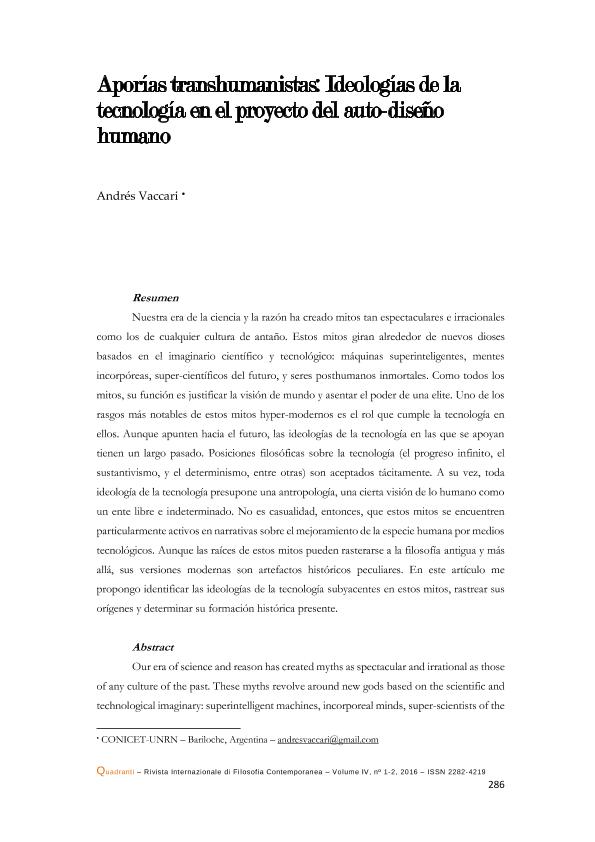Mostrar el registro sencillo del ítem
dc.contributor.author
Vaccari, Andrés

dc.date.available
2018-10-19T17:40:23Z
dc.date.issued
2016-03
dc.identifier.citation
Vaccari, Andrés; Aporías transhumanistas: Ideologías de la tecnología en el proyecto del auto-diseño humano; Il Sapere; Quadranti; 4; 1-2; 3-2016; 286-320
dc.identifier.issn
2282-4219
dc.identifier.uri
http://hdl.handle.net/11336/62791
dc.description.abstract
Nuestra era de la ciencia y la razón ha creado mitos tan espectaculares e irracionales como los de cualquier cultura de antaño. Estos mitos giran alrededor de nuevos dioses basados en el imaginario científico y tecnológico: máquinas superinteligentes, mentes incorpóreas, super-científicos del futuro, y seres posthumanos inmortales. Como todos los mitos, su función es justificar la visión de mundo y asentar el poder de una elite. Uno de los rasgos más notables de estos mitos hyper-modernos es el rol que cumple la tecnología en ellos. Aunque apunten hacia el futuro, las ideologías de la tecnología en las que se apoyan tienen un largo pasado. Posiciones filosóficas sobre la tecnología (el progreso infinito, el sustantivismo, y el determinismo, entre otras) son aceptados tácitamente. A su vez, toda ideología de la tecnología presupone una antropología, una cierta visión de lo humano como un ente libre e indeterminado. No es casualidad, entonces, que estos mitos se encuentren particularmente activos en narrativas sobre el mejoramiento de la especie humana por medios tecnológicos. Aunque las raíces de estos mitos pueden rasterarse a la filosofía antigua y más allá, sus versiones modernas son artefactos históricos peculiares. En este artículo me propongo identificar las ideologías de la tecnología subyacentes en estos mitos, rastrear sus orígenes y determinar su formación histórica presente.
dc.description.abstract
Our era of science and reason has created myths as spectacular and irrational as those of any culture of the past. These myths revolve around new gods based on the scientific and technological imaginary: superintelligent machines, incorporeal minds, super-scientists of the uture, and immortal posthuman beings. Like all myths, their function is to justify the worldview and secure the power of an elite. One of the most notable features of these hyper-modern myths is the role technology plays in them. A lthough ostensibly set in the future, the ideologies of technology on which they are based have a long past. Certain philosophical positions on technology (infinite progress, substantivism, and determinism, mong others) are tacitly accepted. In turn, every ideology of technology presupposes an anthropology, a certain vision of the human as a free and indeterminate entity. It is no coincidence, then, that these myths are particularly active in narratives on the improvement of the human species by technological means. Although the roots of these myths can be traced back to ancient philosophy and beyond, their modern versions are peculiar historical artifacts. In this article I intend to identify the ideologies of technology underlying these myths, trace their origins and determine their present historical formation.
dc.format
application/pdf
dc.language.iso
spa
dc.publisher
Il Sapere
dc.rights
info:eu-repo/semantics/openAccess
dc.rights.uri
https://creativecommons.org/licenses/by-nc-sa/2.5/ar/
dc.subject
Modificación Humana
dc.subject
Transhumanismo
dc.subject
Filosofía de La Tecnología
dc.subject.classification
Estudios Religiosos

dc.subject.classification
Filosofía, Ética y Religión

dc.subject.classification
HUMANIDADES

dc.title
Aporías transhumanistas: Ideologías de la tecnología en el proyecto del auto-diseño humano
dc.type
info:eu-repo/semantics/article
dc.type
info:ar-repo/semantics/artículo
dc.type
info:eu-repo/semantics/publishedVersion
dc.date.updated
2018-09-14T14:26:27Z
dc.journal.volume
4
dc.journal.number
1-2
dc.journal.pagination
286-320
dc.journal.pais
Italia

dc.journal.ciudad
Salerno
dc.description.fil
Fil: Vaccari, Andrés. Universidad Nacional de Río Negro. Sede Andina. Centro de Estudios en Ciencia, Tecnología, Cultura y Desarrollo; Argentina. Consejo Nacional de Investigaciones Científicas y Técnicas. Centro Científico Tecnológico Conicet - Patagonia Norte; Argentina
dc.journal.title
Quadranti
dc.relation.alternativeid
info:eu-repo/semantics/altIdentifier/url/http://www.rivistaquadranti.eu
dc.relation.alternativeid
info:eu-repo/semantics/altIdentifier/url/https://www.rivistaquadranti.eu/riviste/05/Vaccari_16.pdf
Archivos asociados
